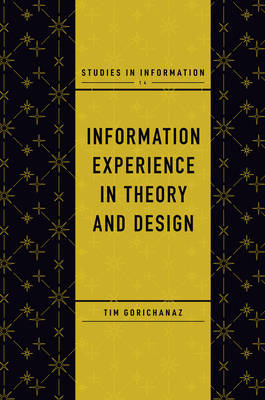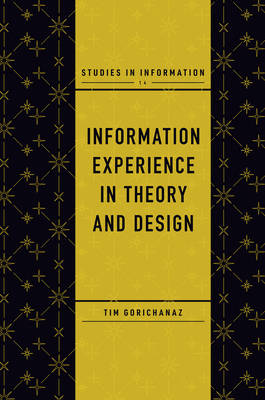
- Retrait gratuit dans votre magasin Club
- 7.000.000 titres dans notre catalogue
- Payer en toute sécurité
- Toujours un magasin près de chez vous
- Retrait gratuit dans votre magasin Club
- 7.000.0000 titres dans notre catalogue
- Payer en toute sécurité
- Toujours un magasin près de chez vous
Description
In this volume, author Tim Gorichanaz seeks to re-frame the discussion of information engagement through the lens of information experience, an exciting emerging area within information science.
Unlike traditional information behavior research, which is limited to how people need, seek, and search for information, information experience looks at how people understand, use, and are shaped by information. In this way, information experience connects with other human-centered areas of information research and design, including information literacy and human-computer interaction.
Split into three parts, Information Experience in Theory and Design presents a multifaceted investigation of information experience, centered around the themes of understanding, self, and meaning. Part One (Understanding) explores the link between information, understanding and questioning; how moral change arises from information; and how to design for understanding. Part Two (Self) explores the concept of the human self as information; the links between information, identity and society; and how to design for self-care. Finally, Part Three (Meaning) explores the connection between information and meaning; how meaning and craft contribute to the good life; and how to design for meaning.
Offering a rigorous theoretical foundation for information experience and insights for design, Gorichanaz brings together research from across the information field as well as philosophy. For researchers or students in any area of the information field, from librarianship to human-computer interaction, this is an exciting new text investigating a fascinating new field of study.
Unlike traditional information behavior research, which is limited to how people need, seek, and search for information, information experience looks at how people understand, use, and are shaped by information. In this way, information experience connects with other human-centered areas of information research and design, including information literacy and human-computer interaction.
Split into three parts, Information Experience in Theory and Design presents a multifaceted investigation of information experience, centered around the themes of understanding, self, and meaning. Part One (Understanding) explores the link between information, understanding and questioning; how moral change arises from information; and how to design for understanding. Part Two (Self) explores the concept of the human self as information; the links between information, identity and society; and how to design for self-care. Finally, Part Three (Meaning) explores the connection between information and meaning; how meaning and craft contribute to the good life; and how to design for meaning.
Offering a rigorous theoretical foundation for information experience and insights for design, Gorichanaz brings together research from across the information field as well as philosophy. For researchers or students in any area of the information field, from librarianship to human-computer interaction, this is an exciting new text investigating a fascinating new field of study.
Spécifications
Parties prenantes
- Auteur(s) :
- Editeur:
Contenu
- Nombre de pages :
- 216
- Langue:
- Anglais
- Collection :
- Tome:
- n° 14
Caractéristiques
- EAN:
- 9781839093692
- Date de parution :
- 01-10-20
- Format:
- Livre relié
- Format numérique:
- Genaaid
- Dimensions :
- 155 mm x 231 mm
- Poids :
- 453 g

Les avis
Nous publions uniquement les avis qui respectent les conditions requises. Consultez nos conditions pour les avis.






